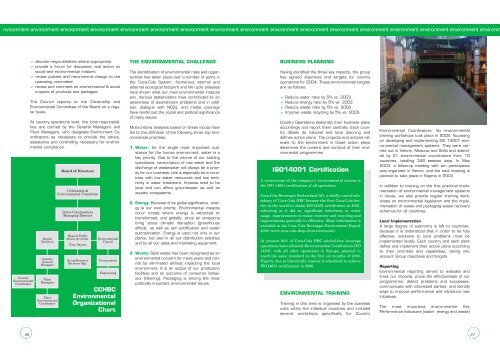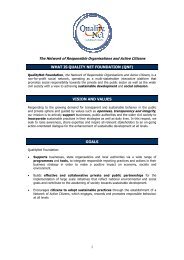APOLOGISMOS CCHBC final - Coca-Cola Hellenic
APOLOGISMOS CCHBC final - Coca-Cola Hellenic
APOLOGISMOS CCHBC final - Coca-Cola Hellenic
Create successful ePaper yourself
Turn your PDF publications into a flip-book with our unique Google optimized e-Paper software.
nvironment environment environment environment environment environment environment environment environment environment environment environment environment environment environment environment environm<br />
Country<br />
Environmental<br />
Coordinator<br />
allocate responsibilities where appropriate<br />
provide a forum for discussion and action on<br />
social and environmental matters<br />
review policies and recommend change to the<br />
operating committee<br />
review and comment on environmental & social<br />
impacts of products and packages<br />
The Council reports to the Citizenship and<br />
Environmental Committee of the Board on a regular<br />
basis.<br />
At country operations level, the local responsibilities<br />
are carried by the General Managers and<br />
Plant Managers, who designate Environment Coordinators<br />
as necessary to provide the advice,<br />
assistance and controlling necessary for environmental<br />
compliance.<br />
Region<br />
Directors<br />
Country<br />
General<br />
Managers<br />
Plant<br />
Managers<br />
Plant<br />
Environmental<br />
Coordinator<br />
Board of Directors<br />
Citizenship &<br />
Environmental Committee<br />
Doros Constantinou<br />
Managing Director<br />
Head of Public<br />
Affairs & Comm.<br />
Tony Baynes<br />
Group Resource<br />
Recovery Mgr.<br />
Environmental<br />
Council<br />
Procurement<br />
Engineering<br />
<strong>CCHBC</strong><br />
Environmental<br />
Organizational<br />
Chart<br />
THE ENVIRONMENTAL CHALLENGE<br />
The identification of environmental risks and opportunities<br />
has taken place over a number of years in<br />
the <strong>Coca</strong>-<strong>Cola</strong> System. Numerous internal and<br />
external ecological footprint and life cycle analyses<br />
have shown what our main environmental impacts<br />
are. Various stakeholders have contributed to an<br />
awareness of downstream problems and in addition,<br />
dialogue with NGOs, and media coverage<br />
have reinforced the social and political significance<br />
of many issues.<br />
Multi-criteria analyses based on these inputs have<br />
led to the definition of the following three top environmental<br />
priorities:<br />
1. Water: As the single most important substance<br />
for the human environment, water is a<br />
key priority. Due to the volume of our bottling<br />
operations, consumption of raw water and the<br />
discharge of wastewater will always be a priority<br />
for our business, this is especially so in countries<br />
with low water resources and low technicity<br />
in water treatment. Impacts tend to be<br />
local and can affect groundwater as well as<br />
aquatic ecosystems.<br />
2. Energy: Because of its global significance, energy<br />
is our next priority. Environmental impacts<br />
occur mostly where energy is extracted or<br />
transformed, and globally, since air emissions<br />
bring about climatic disruption (greenhouse<br />
effect), as well as soil acidification and water<br />
eutrophication. Energy is used not only in our<br />
plants, but also in all our distribution activities<br />
and by all our sales and marketing equipment.<br />
3. Waste: Solid waste has been recognised as an<br />
environmental concern for many years and cannot<br />
be eliminated without impacting the local<br />
environment. It is an output of our production<br />
facilities and an outcome of consumer behaviour<br />
(littering). Packaging is among the most<br />
politically important environmental issues.<br />
BUSINESS PLANNING<br />
Having identified the three key impacts, the group<br />
has agreed objectives and targets for country<br />
operations for 2004. These environmental targets<br />
are as follows:<br />
Reduce water ratio by 5% vs. 2003<br />
Reduce energy ratio by 5% vs. 2003<br />
Reduce waste ratio by 5% vs. 2003<br />
Improve waste recycling by 5% vs. 2003.<br />
Country Operations elaborate their business plans<br />
accordingly and report them centrally. Each country<br />
details its national and local planning and<br />
defines action plans. The projects and actions relevant<br />
to the environment in those action plans<br />
determine the content and conduct of their environmental<br />
programmes.<br />
ISO14001 Certification<br />
A cornerstone of the company’s environmental actions is<br />
the ISO 14001 certification of all operations.<br />
<strong>Coca</strong>-<strong>Cola</strong> Beverages Switzerland AG, a wholly-owned subsidiary<br />
of <strong>Coca</strong>-<strong>Cola</strong> HBC became the first <strong>Coca</strong>-<strong>Cola</strong> bottler<br />
in the world to obtain ISO14001 certification in 2001,<br />
achieving as it did so, significant reductions in water<br />
usage, improvements in waste recovery and recycling and<br />
improvements generally in efficiency. More information is<br />
available in the <strong>Coca</strong>-<strong>Cola</strong> Beverages Environment Report<br />
2002 (www.coca-cola-shop.ch/environment).<br />
At present 84% of <strong>Coca</strong>-<strong>Cola</strong> HBC alcohol-free beverage<br />
operations have achieved Environmental Certification ISO<br />
14001, with all other operations in Europe, planned to<br />
reach the same standard in the first six months of 2004.<br />
Nigeria, due to historically reasons is scheduled to achieve<br />
ISO14001 certification in 2006.<br />
ENVIRONMENTAL TRAINING<br />
Training in this area is organised by the business<br />
units within the individual countries and included<br />
several workshops specifically for Country<br />
Environmental Coordinators: Six environmental<br />
training workshops took place in 2002, focussing<br />
on developing and implementing ISO 14001 environmental<br />
management systems. They were carried<br />
out in Vienna, Moscow and Sofia and attended<br />
by 51 environmental coordinators from 19<br />
countries, totalling 348 session days. In May<br />
2003, a follow-up meeting with ten participants<br />
was organized in Vienna, and the next meeting is<br />
planned to take place in Nigeria in 2004.<br />
In addition to training on the this practical implementation<br />
of environmental management systems<br />
in house, we also provide regular training workshops<br />
on environmental legislation and the implementation<br />
of waste and packaging waste recovery<br />
schemes for all countries.<br />
Local Implementation<br />
A large degree of autonomy is left to countries,<br />
because it is understood that in order to be fully<br />
effective, solutions to local problems must be<br />
implemented locally. Each country and each plant<br />
define and implement their action plans according<br />
to their priorities and capabilities, taking into<br />
account Group objectives and targets.<br />
Reporting<br />
Environmental reporting serves to evaluate and<br />
track our impacts, prove the effectiveness of our<br />
programmes, detect problems and successes,<br />
communicate with interested parties, and identify<br />
ways to improve performance and introduce new<br />
initiatives.<br />
The most important environmental Key<br />
Performance Indicators (water, energy and waste)<br />
26<br />
27







